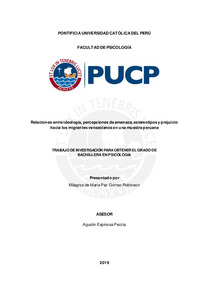| dc.contributor.advisor | Espinosa Pezzia, Agustín | |
| dc.contributor.author | Gomez Robinson, Milagros de Maria Paz | |
| dc.date.accessioned | 2021-02-02T02:07:05Z | |
| dc.date.available | 2021-02-02T02:07:05Z | |
| dc.date.created | 2019 | |
| dc.date.issued | 2021-02-01 | |
| dc.identifier.uri | http://hdl.handle.net/20.500.12404/18062 | |
| dc.description.abstract | El presente estudio tiene como objetivo analizar la relación entre los estereotipos, el prejuicio
ambivalente y las emociones hacia la migración venezolana en el contexto peruano. Además, busca
analizar el rol mediador de la amenaza y las variables ideológicas (orientación a la dominancia social
y autoritarismo de derecha) en la relación entre estereotipos y prejuicio. La muestra estuvo
conformada por 115 participantes de nacionalidad peruana, entre los 18 y 60 años, que al momento
de la aplicación residen en Lima. Se solicitó que completaran voluntariamente la ficha
sociodemográfica, algunas preguntas de contacto y similitud intergrupal, y seis cuestionarios que
miden las variables propuestas en los objetivos. La aplicación fue virtual y presencial. Los resultados
confirman la relación inversa entre representación positiva y prejuicio, es decir, mientras más
estereotipos de competencia, calidez o moralidad mantienen, menor es el prejuicio en sus expresiones
sutil y manifiesto. Con respecto a las emociones, la ira, el miedo y el desprecio presentan
correlaciones directas con el prejuicio. Además, la incorporación de las variables de ideología y
amenaza al modelo de mediación disminuye el coeficiente de regresión entre estereotipos y prejuicio.
En conclusión, se analizan las relaciones entre las variables estudiadas, y se discute su relevancia para
la implementación de intervenciones que promuevan el contacto intergrupal, la inclusión social y el
cuestionamiento de agentes políticos y mediáticos que refuerzan las jerarquías sociales y una
representación amenazante del inmigrante latinoamericano. | es_ES |
| dc.description.abstract | The present study seeks to analyze the relationship between stereotypes, ambivalent prejudice
and emotions towards Venezuelan immigration in the Peruvian context. In addition, it aims to analyze
the mediating role of threat and ideological variables (social dominance orientation and right-wing
authoritarianism) in the relationship between stereotypes and prejudice. The sample consisted of 115
participants of Peruvian nationality, aged between 18 and 60, living in Lima at the time of application.
They were asked to voluntarily complete the sociodemographic form, some contact and inter-group
similarity questions, and six questionnaires measuring the variables presented in the objectives. The
application was both virtual and in person. The results confirm the inverse relationship between
positive representation and prejudice, in other words, the more stereotypes of competence, warmth or
morality they have, the less prejudice appears in their subtle and manifest expressions. Concerning
emotions, anger, fear and contempt present direct correlations with prejudice. In addition, the
incorporation of ideology and threat variables to the mediation model decreases the regression
coefficient between stereotypes and prejudice. To conclude, the relationships between the variables
studied are analyzed, and their relevance for the implementation of interventions that promote intergroup
contact, social inclusion, and the questioning of political and media agents that reinforce social
hierarchies and a threatening representation of the Latin American immigrant is discussed | es_ES |
| dc.language.iso | spa | es_ES |
| dc.publisher | Pontificia Universidad Católica del Perú | es_ES |
| dc.rights | info:eu-repo/semantics/openAccess | es_ES |
| dc.rights.uri | http://creativecommons.org/licenses/by-nd/2.5/pe/ | * |
| dc.subject | Estereotipo (Psicología) | es_ES |
| dc.subject | Prejuicios--Aspectos psicológicos | es_ES |
| dc.subject | Migrantes--Venezuela--Aspectos psicológicos | es_ES |
| dc.subject | Migración e inmigración--Perú--Aspectos psicológicos | es_ES |
| dc.title | Relaciones entre ideología, percepciones de amenaza, estereotipos y prejuicio hacia los migrantes venezolanos en una muestra peruana | es_ES |
| dc.type | info:eu-repo/semantics/bachelorThesis | es_ES |
| thesis.degree.name | Bachiller en Psicología | es_ES |
| thesis.degree.level | Bachillerato | es_ES |
| thesis.degree.grantor | Pontificia Universidad Católica del Perú. Facultad de Psicología | es_ES |
| thesis.degree.discipline | Psicología | es_ES |
| renati.advisor.dni | 10300382 | |
| renati.advisor.orcid | https://orcid.org/0000-0002-2275-5792 | es_ES |
| renati.author.dni | 73108368 | |
| renati.discipline | 313016 | es_ES |
| renati.level | https://purl.org/pe-repo/renati/level#bachiller | es_ES |
| renati.type | https://purl.org/pe-repo/renati/type#trabajoDeInvestigacion | es_ES |
| dc.publisher.country | PE | es_ES |
| dc.subject.ocde | http://purl.org/pe-repo/ocde/ford#5.01.00 | es_ES |






